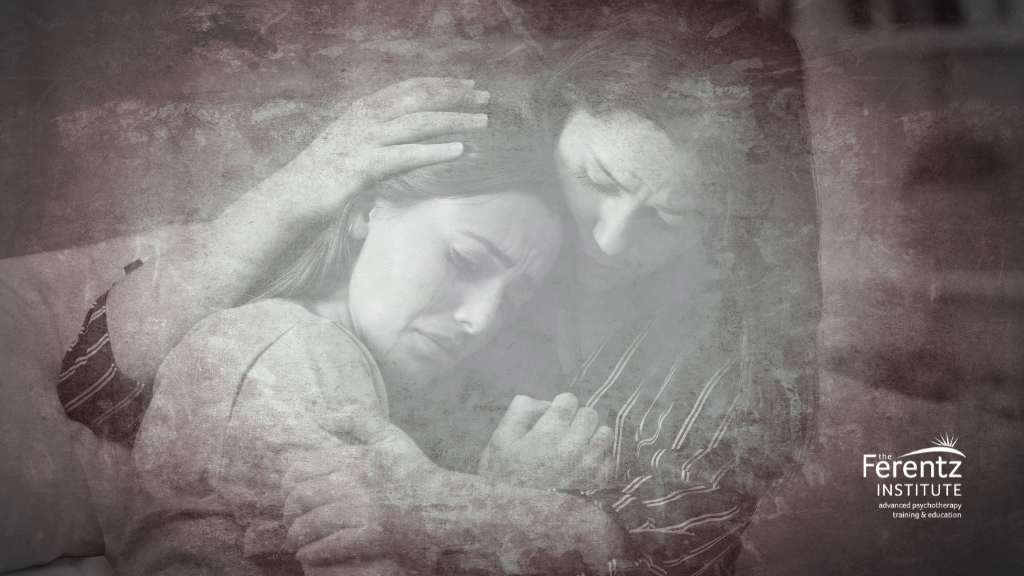
This week I was asked to speak at a local synagogue to offer community members strategies to help them navigate the vicarious trauma they’ve been experiencing from the war in Israel and the subsequent antisemitic uprisings in the United States. As a trauma specialist, I often focus on the inevitable sequelae that follows trauma: symptoms of PTSD. But our current reality is different. This isn’t about Post-traumatic Stress, it’s about present and ongoing traumatic stress, and the feelings of terror, helplessness, and hopelessness are real, permeating our daily lives. I’d like to humbly share some of the simple suggestions I made in my presentation using the acronym COPE. It is my sincere hope that it mitigates some of the anxiety, pain, or suffering that you and your clients- Jews and non-Jews alike, might be experiencing.
C-connect and comfort
We are biologically hard-wired to do social engagement, to reach out to others, in times of threat or terror. We are not wired to isolate or navigate traumatic experience alone. Spend extra time with friends and family. Preferably in person, as it feels energetically better, but it’s equally valuable to connect by phone, through text, or online. If you feel overwhelmed, anxious, or frightened at night take advantage of 24-hour hotlines. In addition, connect with nature. Walk outside, either in a local park or your own neighborhood, breath slowly and deeply and notice what there is to be grateful for in your surroundings.
Engage in acts of self-care. It’s such an important antidote to traumatization.
Talk to yourself with loving kindness. Now more than ever- there is so much vitriolic rhetoric and antisemitic sentiments- we need to put aside the internal voice that judges, criticizes, or shames us. We can’t control how other people talk to us or about us, but we can completely control how we talk to ourselves about ourselves. I also encourage you to hug more, it releases endorphins, and calms your physiology. So does aromatherapy, reading positive affirmations, and listening to soothing or uplifting music.
O-observe
Take the time to notice how world events are impacting you cognitively, emotionally, behaviorally, somatically, and spiritually- and attend to the impact that it’s having. Make time to exercise, walk, or dance so you’re not stuck in a “freeze” response. If it resonates for you, use prayer to send positive energy into the universe and turn overwhelming thoughts and feelings over to a higher power. It can help spiritually. Make sure you’re not numbing or self-medicating with excessive food or alcohol and avoid using medical marijuana- those things increase depression and anxiety. Be intentional about getting enough sleep. Use a Sleep App to help if you struggle at night, and don’t watch the news or go on social media before bed.
P-protect and be proactive
Significantly limit your exposure to the news and social media platforms in general. If you have a prior history of trauma, be aware of the vulnerability of past experiences getting rekindled by current traumatic events. Limit discussions with friends and family about Israel and politics in general, especially if you have differing ideologies. Be intentional about counter-balancing stories of war atrocities with stories that are uplifting and hopeful, highlighting the countless acts of goodness and kindness that still exist in the world.
Be proactive by not getting stuck in “why is this happening?” and instead focus on “What can I do to help?” Keep donating, send emails and text messages to friends and family in Israel. Let them know they are not alone. If you can, volunteer your mental health services online to organizations in Israel. Take on a new behavior and do it to honor the memory of those who have been injured or murdered. Do it to bring healing energy to the world. Even lighting a single candle each day symbolically helps to create light during a time that can feel so dark.
E-Express emotions
Discuss how you feel with people you trust, including a therapist, so you can be less burdened. Journaling, drawing, or collaging words and images that express what you feel will help you metabolize those emotions so you don’t continually hold on to them. When they are not processed, they build up and can create a state of overwhelm or despair. But a word of caution: social media is not a healthy place to process your feelings. You often don’t get the validation or support you deserve. Choose safe, loving people who can be compassionate witnesses to your pain.
Resources for Support
- GrassRoots 24 Hotline- 410-531-6677
- LifeLine 24 Hour Mental Health Support- 988
- Substance Abuse and Mental Health Services Helpline 1-800-662-4357
- National Suicide Prevention Lifeline- 1-800-273-8255
- Crisis Text Line- text HOME to 741741
- Moodfit: free app that helps you track your mood and provides resources for managing negative emotions
- Happify: free downloadable app to manage anxiety and depression
- Better Sleep: downloadable app to help with sleep issues
- Calm: downloadable app for meditation and sleep
- HeadSpace: free meditations for relaxation and to reduce anxiety and depression
- Breath2Relax: free guided exercises to reduce the symptoms of anxiety
- Time Out: app to help track, monitor and control cell phone and social media usage
- Coloringcastle.com: website to download free mandalas for coloring and word games to reduce obsessive thinking


Thank you for your words of wisdom- they are words to recall and to practice often, but especially now as we grapple with this horrific reality. When you just can’t make rational sense out of irrational behavior, it’s helpful to focus on what you can control in your sphere of the universe.
We are lucky in our profession- the getting is in the giving. As we help others through this unimaginable time , with a frightening and insecure future before us, we reinforce sanity for ourselves, as well.
Very good advice Lisa. The only thing I would say is that we should also send text and emails to people in Palestine and Gaza if possible and to volunteer our Mental Health Services to Palestinian Americans who have lost family members. I have friends in Gaza now and friends in Israel. I suggest you change the proactive part to reflect this balance. All the best, Perry King, a fan of your blog and former student
Thank you for your message, Perry. There are certainly innocent Arabs living in Israel and the Gaza Strip who deserve and need support as well. – Lisa
Wise and caring words, Lisa. Thank you. My heart is with you and Israel.
Shalom, shalom, dear one,
Shelly Ishii, LCSW-C
Thank you for the great resources!